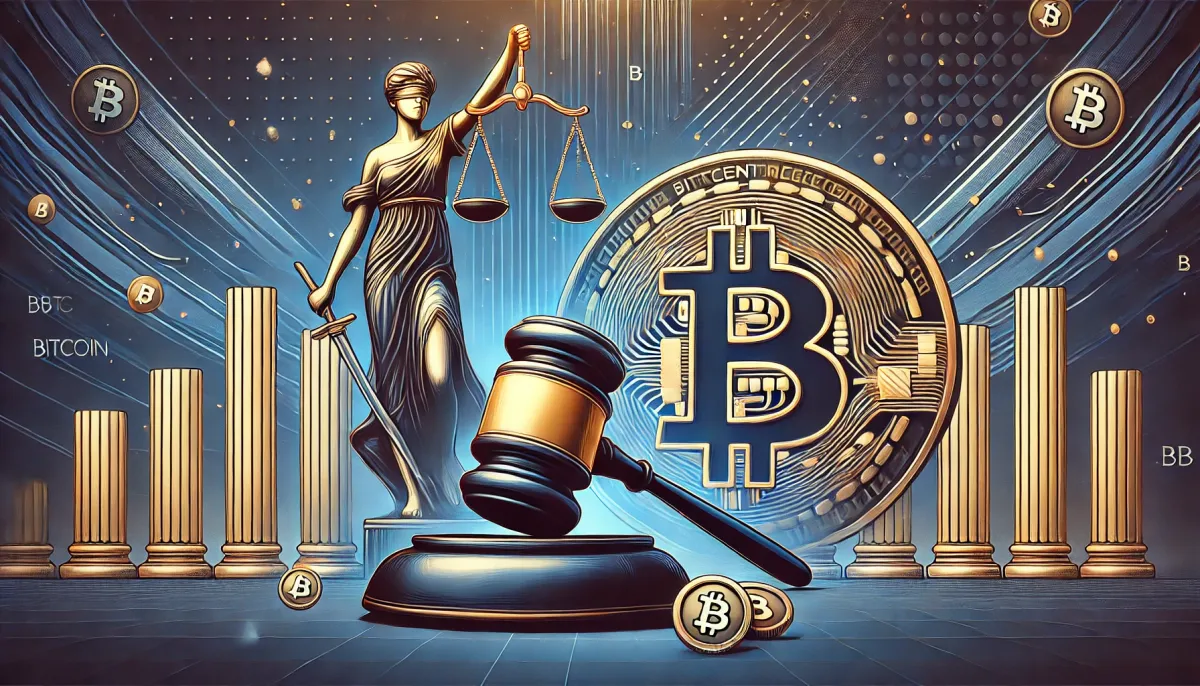The End of Chevron: A New Era for Judicial Independence and Regulatory Clarity
The Sept 10, 2024 of The Bitcoin Layer podcast features Philip Hamburger, who centers on the recent Supreme Court decision to overturn the Chevron Doctrine, a legal principle that had allowed administrative agencies to interpret ambiguous statutes when implementing regulations.

Briefing Notes
My 'Briefing Note' summaries focus on the content of podcast episodes; they do not reflect my own views. If you have comments about this short take note, please leave a comment below (requires signing up for a free blog subscription). Note that some of the podcasts I summarize are likely sponsored episodes: don't trust, verify, if the information you are looking for is to be used for decision-making.
Summary
In the September 10, 2024 episode of The Bitcoin Layer, Philip Hamburger discusses The Supreme Court’s decision to overturn the Chevron Doctrine restores judicial independence and reduces agency overreach, marking a significant shift towards clearer, more accountable regulatory practices that could greatly benefit industries and protect civil liberties.
Take-Home Messages
- Judicial Independence: The removal of the Chevron Doctrine allows judges to make independent legal decisions, enhancing the fairness and integrity of judicial processes.
- Civil Liberties Protection: Limiting agency power helps protect constitutional rights by ensuring regulations are grounded in clear legislative authority.
- Regulatory Stability: The decision reduces regulatory uncertainty, especially in emerging sectors like digital assets, by requiring explicit congressional mandates for regulations.
- Vigilance Against Guidance Overreach: Agencies may turn to non-binding guidance to influence behavior without formal regulations, necessitating ongoing legal scrutiny.
- Future Legal Reforms Needed: Continued efforts are essential to prevent the resurgence of Chevron-like doctrines and maintain the balance of power across government branches.
Overview
The Supreme Court’s recent decision to overturn the Chevron Doctrine represents a significant rebalancing of power among the legislative, executive, and judicial branches of the U.S. government. Previously, Chevron allowed regulatory agencies to interpret ambiguous statutes, granting them broad quasi-legislative powers that often lacked direct congressional oversight. This deference to agency interpretation not only blurred the lines between distinct branches of government but also compromised judicial independence, as courts were required to uphold agency interpretations of the law.
Philip Hamburger argues that this ruling is a crucial step towards restoring constitutional governance and protecting civil liberties. By removing the Chevron Doctrine, the judiciary can exercise independent judgment without deferring to agency biases, leading to fairer legal outcomes. Moreover, the decision curtails the administrative state’s ability to act as a de facto fourth branch of government, blending legislative, judicial, and executive functions in ways that threaten individual rights and democratic accountability.
For industries, particularly those under heavy regulatory scrutiny such as digital assets, the end of Chevron offers the promise of a clearer and more predictable regulatory environment. However, Hamburger warns that agencies may still seek to exert influence through non-binding guidance, which can evade judicial review and continue to pose challenges to constitutional principles. This highlights the need for ongoing legal vigilance to ensure that regulatory practices align with the foundational separation of powers.
Stakeholder Perspectives
- Regulatory Agencies: Agencies may view the overturning of Chevron as a significant constraint on their ability to interpret and enforce regulations. This decision limits their scope of action and may necessitate a shift towards clearer, congressionally approved mandates.
- Judiciary: The judiciary stands to regain independence, with judges no longer required to defer to agency interpretations. This shift is expected to restore judicial authority and enhance fairness in legal proceedings involving regulatory disputes.
- Industry and Investors: Businesses, particularly in sectors like digital assets, may welcome the ruling as a means to reduce regulatory uncertainty. A clearer separation between agency power and legislative intent could foster a more stable and predictable business environment.
- Civil Liberties Advocates: Organizations focused on protecting civil liberties view the decision as a critical victory in the fight against administrative overreach. By curbing the power of agencies, the ruling safeguards individual rights and reinforces constitutional principles.
Implications
The Supreme Court’s decision to overturn the Chevron Doctrine has important implications for regulatory practices, judicial independence, and the protection of civil liberties. By reasserting the distinct roles of the legislative, judicial, and executive branches, the ruling enhances the accountability of regulatory agencies, ensuring that regulations are rooted in clear legislative intent. This shift is likely to benefit industries by reducing regulatory uncertainty, promoting a fairer business environment, and encouraging investment, particularly in emerging sectors like digital assets.
However, the ruling also presents challenges, as agencies may attempt to circumvent these changes by relying on non-binding guidance to influence behavior. The potential for continued overreach underscores the need for ongoing legal vigilance and public support for civil liberties advocacy. Stakeholders, including businesses, investors, and policymakers, must remain engaged in the regulatory process to ensure that the principles of judicial independence and constitutional governance are upheld.
Future Outlook
The decision to overturn the Chevron Doctrine is a pivotal step towards rebalancing the power dynamics within the U.S. government. As agencies adapt to the new legal landscape, there will be a need for careful oversight to prevent the emergence of new forms of regulatory overreach. The future may see continued legal reforms aimed at safeguarding the separation of powers and ensuring that agencies operate within the bounds of their authority. For industries and civil liberties advocates alike, the focus will be on building a regulatory framework that is transparent, accountable, and aligned with democratic principles.
Information Gaps
- Judicial Independence and Regulatory Balance: Research is needed to explore the full impact of restored judicial independence on the relationship between courts and regulatory agencies.
- Civil Liberties and Regulatory Overreach: Studies should assess how the rollback of agency power improves protections for civil liberties across various sectors.
- Digital Asset Regulation Post-Chevron: Investigation into how the overturning of Chevron will specifically affect the regulatory landscape for digital assets is critical for market participants.
- Preventing Arbitrary Regulations: Further research is necessary to develop frameworks that prevent the recurrence of arbitrary regulatory practices, such as those seen in Operation Chokepoint.
- Protections Against Regulatory Retaliation: Identifying strategies to protect businesses and individuals from retaliation when challenging regulatory actions remains a key area for future study.
Broader Implications for Bitcoin
Regulatory Clarity and Stability
The overturning of the Chevron Doctrine introduces the potential for a more predictable and stable regulatory environment for Bitcoin and other digital assets. By requiring clear legislative mandates for regulatory actions, this shift reduces the likelihood of arbitrary or overly broad interpretations by agencies, providing greater legal certainty for market participants. This can foster an environment conducive to innovation and investment in the Bitcoin ecosystem.
Protection Against Overreach
The decision to limit agency power directly aligns with Bitcoin's foundational ethos of decentralization and resistance to centralized control. By curbing the ability of regulatory bodies to impose ambiguous rules, the ruling offers a safeguard against potential overreach that could stifle the growth of Bitcoin. This is particularly relevant given the historical context of Operation Chokepoint, where financial services were restricted without clear legislative backing, posing risks to businesses operating in the Bitcoin space.
Judicial Independence and Fair Legal Outcomes
Restoring judicial independence ensures that disputes involving Bitcoin and digital assets are judged on their merits rather than being swayed by agency biases. This could lead to fairer outcomes in cases where regulatory actions are contested, offering a more balanced playing field for Bitcoin businesses facing enforcement actions. It reinforces the principle that regulatory decisions should be transparent, accountable, and rooted in law, rather than agency discretion.
Implications for Bitcoin Adoption and Institutional Involvement
Greater regulatory clarity and the reduction of arbitrary enforcement actions could enhance the appeal of Bitcoin to institutional investors. As the legal environment becomes less uncertain, more institutions may be willing to engage with Bitcoin, potentially accelerating adoption and integration into mainstream financial systems. This could drive further market maturation and increase Bitcoin’s role as a legitimate asset class.
Ongoing Vigilance and Advocacy
Despite the positive steps towards regulatory reform, the potential for agencies to rely on non-binding guidance as a substitute for formal regulations remains a concern. Bitcoin advocates and industry participants will need to remain vigilant, actively engaging in policy discussions and supporting legal actions that uphold the principles of judicial independence and clear regulatory frameworks. Continued advocacy is essential to prevent new forms of overreach and to protect the decentralized nature of Bitcoin.
The Broader Societal Impact
The Chevron ruling also underscores the importance of constitutional governance in protecting individual freedoms, which resonates with the Bitcoin community's values of financial sovereignty and individual rights. By reinforcing the separation of powers and limiting the administrative state, the decision aligns with broader societal goals of reducing governmental overreach and preserving civil liberties. This alignment may further solidify Bitcoin's position as not just a financial asset but also a tool for promoting personal and economic freedom.



Comments ()